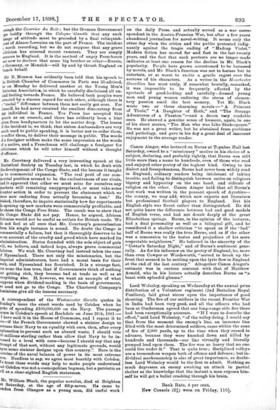Mr. William Black, the popular novelist, died at Brighton at
Saturday, at the age of fifty-seven. He came to ondon from Glasgow as a young man, did useful work on the daily Press, and actually served as a war corre- spondent in the Austro-Prussian War, but after a few years abandoned journalism for novel-writing. It seems only the other day when the critics and the public protested indig- nantly against the tragic ending of " Madcap Violet." Modern fiction has moved far and fast in the last twenty years, and the fact that such protests are no longer made indicates at least one reason for the decline in Mr. Black's popularity. People have grown accustomed to be harassed by novels, and Mr. Black's function was not to harass but to entertain, or at worst to excite a gentle regret over the sorrows of his characters. As a writer in the Manchester Guardian has most truly, if somewhat brutally, remarked, it was impossible to be frequently affected by the spectacle of good-looking and carefully - dressed young men and young women enduring the stress of elemen- tary passion amid the best scenery. Yet Mr. Black wrote two or three charming novels — " A Princess of Thule," "A Daughter of Heth," and "The Strange Adventures of a Phaeton "—and a dozen very readable ones. He showed a genuine sense of humour, again, in one of his short stories, " The Man who was Like Shakespeare." He was not a great writer, but he abstained from problems and pathology, and gave in his day a great deal of innocent enjoyment to the average reader.










































 Previous page
Previous page